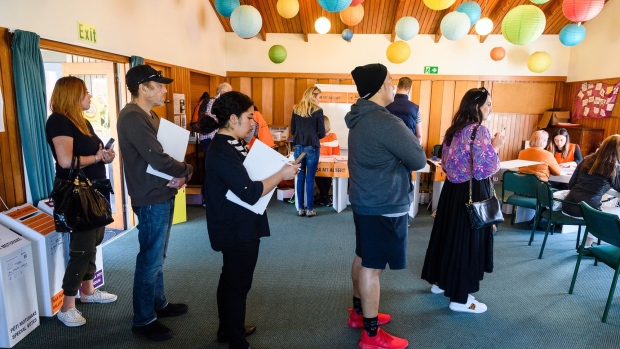Oct 17, 2020
Counting Underway in N.Z. Election as Ardern Eyes Second Term
, Bloomberg News

(Bloomberg) -- Vote counting is underway in New Zealand’s election, with Prime Minister Jacinda Ardern expected to win a second term and a bigger mandate for change.
Polling booths closed at 7 p.m. local time Saturday and the Electoral Commission said it aims to have preliminary results from 95% of voting places by 11:30 p.m. Almost two million people, a record 57% of registered voters, cast early ballots, the commission said.
Ardern’s Labour Party had 46% support in a final opinion poll published Friday, while the main opposition National Party was on 31%. Labour ally the Green Party was on 6%.
Those results would allow Ardern to form New Zealand’s most left-leaning government since 1999 with a Green partner pushing her to be more progressive on social policy and the climate. Still, she will be wary of alienating centrist voters with increased social spending at a time when debt is spiraling due to the government’s pandemic response.
Voters are rewarding Ardern for crushing community transmission of Covid-19 while countries like the U.K., U.S. and even neighboring Australia are still battling to contain the virus.
Her successful management of the crisis has drowned out criticism that she hasn’t delivered on some key promises during her first term in office.
National Party leader Judith Collins has offered temporary tax cuts to spur growth while attacking Ardern for policy failures, but hasn’t been able to gain traction.
Labour’s ascendancy under Ardern has overshadowed her current coalition partner New Zealand First, which at 3.5% in the most recent poll is below the 5% it needs to be returned to parliament. The election may therefore bring the curtain down on the four-decade political career of its leader, Winston Peters, a maverick who’s often held the balance of power.
The libertarian ACT Party has seen its fortunes rise at the expense of both New Zealand First and National. ACT had 8% support in the latest poll.
New Zealand’s proportional representation electoral system lends itself to coalitions, with no party managing to secure an outright majority since its introduction in 1996.
©2020 Bloomberg L.P.






